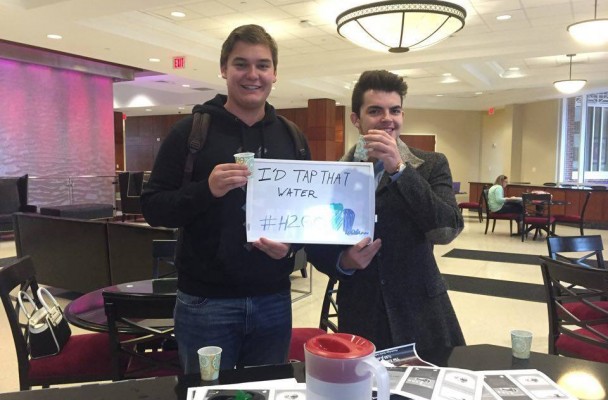Social Influence Psychology class tackles environmental issues

Students take the pledge to not drink from plastic water bottles for a short period of time. Photo submitted
By Alexis Ancel, News Editor//
Throughout the semester an upper level social influence psychology class has been working to raise awareness about environmental issues with a focus on minimizing usage of plastic water bottles as part of their social change project entitled “H2GO.”
This class of 14 students held a blind taste-test on Dec. 1 in which students were asked to sample water from both the tap water on campus and the HPU water bottles given out at the kiosks. The objective was to show that the taste difference is minimal, and therefore more people should drink tap water instead of bottled. In fact, most students actually preferred the fountain water on campus to bottled water.
In addition, raffle tickets were sold at the taste test to raise money toward providing reusable water bottles to students. The class is working toward getting these bottles given out as the welcome gift at the beginning of the school year. They are also encouraging the school to provide jugs of water at the kiosks, so that students can refill their water bottles on the way to class.
“People are so in the habit of getting water bottles at the kiosks and buying water bottles,” Trish Leach, a senior in the class, said. “If we do this more in the beginning of the year it gets people in that mind set.”
Students were also asked to take a pledge to not use disposable water bottles for a time frame of their choosing. While this solution is potentially only short term, the hope is that this small commitment will start people on a path toward eliminating plastic water bottles entirely from their daily lives.
Though recycling is greatly encouraged on campus, Leach noted that it is in fact not the most affective way to positively impact the environment.
“Recycling is the most energy intensive,” Leach said. “Reusing and reducing are much more effective ways to impact the environment.”
The class also held a showing of a film entitled “Tapped” in the cinema on Dec. 2, a documentary depicting the ways in which, contrary to popular belief, bottled water can actually be more dangerous than tap water due to the differences in regulations and the toxic byproducts in the plastic. Dr. Sadie Leder-Elder, professor of this class, noted that while many students were required to attend for class credit, the majority who attended were strongly impacted by the film.
Other work for the project included give back nights at Cold Stone Creamery and Barbaritos in which all proceeds went to Clean Water for North Carolina, a nonprofit organization that works to provide clean, safe drinking water to North Carolina residents. This outreach aspect of the project allows their work to impact both the HPU community and the High Point community as well.
Many different HPU departments were able to team up for this project including the Green Team, Environmental Science Club and HPU Radio. This class emphasizes collaboration use in a variety of areas including marketing and communications.
One of the main goals of this project is to not only implement social change in the community but to learn the skills to take with them after graduation.
“The material doesn’t just live within the bounds of the books or the bounds of the classroom,” Elder said. “My hopes is that they can incorporate it into their lives however they want to.”